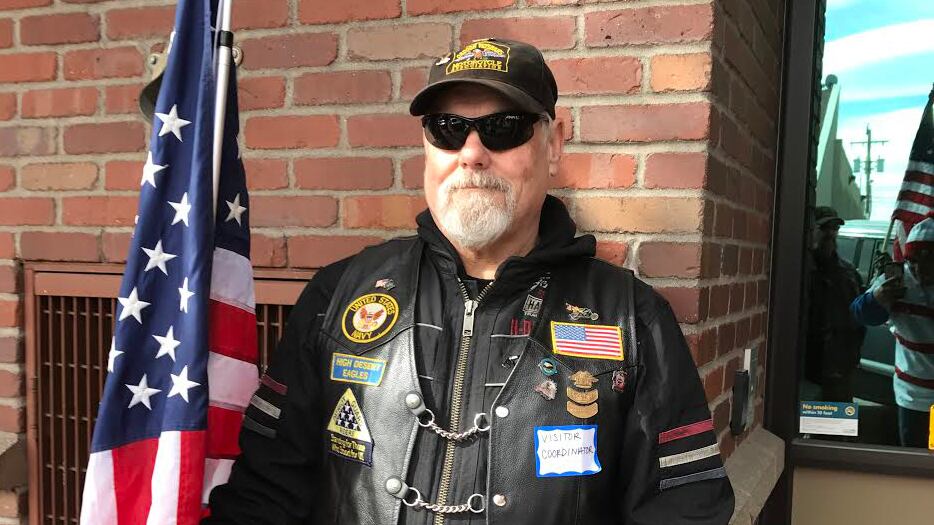On a chilly morning in late February, a group of regular protesters showed up for their weekly demonstration outside the Bend, Ore., office of Republican U.S. Rep. Greg Walden.
But when they arrived, they were met by a group of bikers holding American flags.
The graying men were dressed head-to-toe in leather. Some wore handwritten name tags on their leather vests that read, "Volunteer Coordinator." One smoked a cigar. They told protesters they were asked by Walden's staff to stand guard.
Walden's spokesman and the High Desert Eagles chapter of the Oregon Veterans Motorcycle Association now agree on what happened: A congressional staffer expressed concern over unruly protesters to a veterans group, and that group called in the motorcycle club.
Roger Sabbadini, a 70-year-old retired biology professor among the protesters, laughs at the idea that Walden's staff needed protection. "If [a staffer] felt threatened by a bunch of granola-eating, Patagonia-wearing geezers," he says, "she should have gone to the authorities."
Biker groups nationwide have long taken it upon themselves to act as "security" for various causes. Earlier this year, a group called Bikers for Trump vowed to "form a wall of meat" to ensure protesters didn't interrupt President Donald Trump's inauguration.
The Feb. 28 incident in Bend is hardly on that scale. For one thing, Walden himself was on the other side of the country, in Washington, D.C. But the confrontation, which played out like an AARP-age spinoff of Portland scuffles between right-wing groups and anarchists, shows the tensions among Walden's constituents as he becomes a leading figure in the national Republican Party.

Since early February, as Walden led the GOP's failed effort to repeal and replace the Affordable Care Act, a group of 50 to 100 progressive retiree protesters has made a Tuesday morning ruckus at his Bend office.
The demonstrations are held by members of Indivisible Bend and a seniors group called the Vocal Seniority (motto: "Raising Cane!"). The groups gather for one hour. They hold signs, wave at cars, beat drums and deliver letters and petitions to Walden's fourth-floor office.
"There's a moral obligation and a fiduciary responsibility of our representatives to hear our concerns," says Sabbadini.
Symeon North, a 44-year-old flower farmer and artist, arrived at the Feb. 28 protest expecting a cordial relationship with the congressman's staff. "I walked up, and I was like 'Oh, we have company,'" she says. "There was these dudes in black leather jackets. It was clearly meant to be intimidating."

The men were members of the Oregon Veterans Motorcycle Association's High Desert Eagles chapter, a group of retiree bikers who host charity rides and often hold flags at soldiers' funerals.
North says the bikers confronted her and another woman when they tried to enter the brick building to deliver postcards to Walden's office. A woman who arrived with the bikers blocked her.
In a two-page statement in all-capital letters emailed to WW, Ken Dunn, president of the OVMA, says his group was called by "a female veteran" who "served in the Sandbox Wars in the Middle East" and now works in Walden's office.
That staffer is Margie Anderson, an Iraq vet hired in 2015 by Walden to work on veterans issues. Dunn says protesters crowding Walden's office to deliver protest Valentines on Feb. 14 "proved very disturbing" for Anderson.
"OVMA responded on Feb. 28 with approximately 12 volunteers who wanted to help our fellow veteran," Dunn writes. "They went to Walden's Bend office with USA flags and stood guard. They were on scene to prevent any crowding into Walden's office suite."
Walden's office saw the Feb. 14 protest as alarming, saying about 100 people stormed the hallways of the office building, yelling and chanting. After the event, staffers say Anderson spoke with a veterans mentor through Central Oregon Veterans Council, who contacted the bikers.
"There was no one who was prevented from going into the building—certainly not by us and not by the veterans group," says Walden spokesman Andrew Malcolm.
Malcolm says he thinks protesters are making a fuss out of nothing: "Is it possible that someone is trying to manufacture controversy with you?" he asked.
If anyone on Walden's staff felt fear, Bend police never heard about it. Lt. Clint Burleigh of the Bend Police Department says his agency didn't receive any calls from Walden's office about the Feb. 14 protest. "I've never seen that before where people have come and been security" at a protest, he says.
Ryan Lenz, a senior writer for the Southern Poverty Law Center's Intelligence Project, says retiree motorcycle groups like the OVMA are very different thing from a biker gang. But the need for a staffer to call them for security is curious.
"For a Republican lawmaker to feel they need protection from some out-of-control, bloodthirsty movement on the left seems to me to represent a degree of confusion about just what's happening in this country," Lenz says. "The groups that are targeted most right now in America are not conservative Americans."
After the lunchtime protest was over, the bikers dispersed (another member of the High Desert Eagles confirms they didn't even ride motorcycles that day because it was too cold), but some took something of a victory lap on Facebook.
"We…provided support and assurance of order against the onslaught of verbal abuse from the leftest [sic] demonstrators," OVMA member Robert Eck wrote on the Oregon Tea Party Facebook page. "We need to project our force against the leftists that have infiltrated and now control Oregon."
Correction, April 7: This story incorrectly identified the group asked to act as security by Central Oregon Veterans Outreach. The Group was actually the Central Oregon Veterans Council. WW regrets the error.
